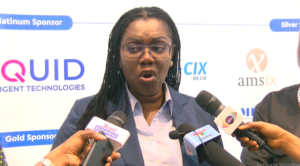Ghana has officially launched its 5G service, marking a pivotal moment in the country’s digital transformation journey. This launch is part of Ghana’s strategic vision to drive economic growth through digitalization and technological advancement. The new 5G network promises ultra-fast internet speeds, reduced latency, and the capability to connect a large number of devices simultaneously, setting the stage for various innovations across multiple sectors.
 President Akufo-Addo celebrated the launch as a “defining moment in our journey towards a digitally inclusive and transformed Ghana.”
President Akufo-Addo celebrated the launch as a “defining moment in our journey towards a digitally inclusive and transformed Ghana.”
Key Aspects of Ghana’s 5G Vision
Enhanced Connectivity and Digital Inclusion
The 5G network aims to bridge the digital divide by improving connectivity, especially in underserved and rural areas. By expanding access to high-speed internet, Ghana can foster greater digital inclusion, allowing more citizens to benefit from digital services like e-learning, telemedicine, and online businesses.

Economic Growth and Industrial Innovation
5G is expected to play a transformative role in sectors like manufacturing, healthcare, agriculture, and education. For instance:
-
- Agriculture: 5G can power IoT devices for precision farming, allowing farmers to monitor crops and soil health in real-time, ultimately increasing yield and efficiency.
- Healthcare: Remote diagnostics and telemedicine will be easier with reliable, high-speed connections, making healthcare more accessible, especially in remote areas.
- Manufacturing and Energy: Factories can use automated systems, smart sensors, and remote monitoring, enhancing productivity and energy efficiency.
- Smart Cities and Infrastructure Development
Ghana’s 5G rollout aligns with its vision of developing smart cities. 5G can support traffic management systems, smart street lighting, and efficient waste management. This infrastructure can lead to safer, cleaner, and more efficient urban spaces, helping manage the challenges of rapid urbanization.
 “This is truly a revolutionary leap forward that promises to redefine connectivity, productivity, and overall quality of life,” remarked Ursula Owusu-Ekuful. “Residents in Accra, Kumasi, and Takoradi will begin experiencing the benefits almost immediately, once the network operators activate it.”
“This is truly a revolutionary leap forward that promises to redefine connectivity, productivity, and overall quality of life,” remarked Ursula Owusu-Ekuful. “Residents in Accra, Kumasi, and Takoradi will begin experiencing the benefits almost immediately, once the network operators activate it.”
- Job Creation and Skill Development
The digital transformation enabled by 5G will require a workforce skilled in new technologies, from IoT to data analytics. As a result, Ghana anticipates creating new job opportunities and fostering programs that enhance digital literacy and tech skills among its youth. - Government Services and E-Government
A faster, more reliable network allows government agencies to enhance their digital services, making processes like obtaining official documents, registering businesses, and accessing public records more efficient for citizens. 5G also provides a platform for secure and transparent governance.

Addressing Challenges
To realize the full potential of 5G, Ghana must address several challenges:
- Infrastructure Investment: Building a nationwide 5G network is costly, especially in remote and rural areas. Public-private partnerships and international investments will be essential to meet infrastructure demands.
- Device Affordability: Not all Ghanaians have access to 5G-compatible devices, which may limit adoption rates. Programs to make these devices affordable or available can boost usage.
- Cybersecurity and Data Privacy: As connectivity increases, so does the risk of data breaches. Strengthening data privacy and cybersecurity regulations will be critical to protect users.
The Future of Ghana’s Digital Transformation
With the launch of 5G, Ghana positions itself as a leading technology hub in West Africa. This leap toward a digital economy has the potential to improve the lives of Ghanaians, foster innovation, and enhance the country’s global competitiveness. The government’s commitment to building a digital economy, combined with private sector innovation and investment, will likely drive Ghana’s transformation in the coming years.



